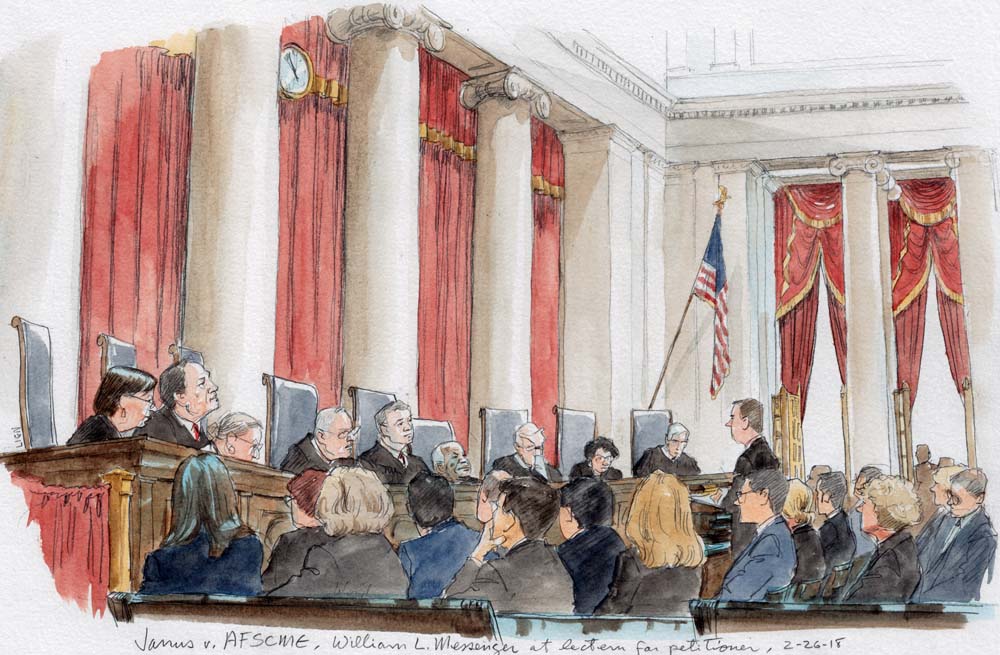A “view” from the courtroom: The dog that didn’t bark

on Feb 26, 2018 at 5:36 pm

Demonstrators have arrived early this morning to exercise their First Amendment rights about the first case for oral argument, Janus v. American Federation of State, County, and Municipal Employees Council 31.
The case was brought by Mark Janus, a child-support specialist for the state of Illinois who does not belong to the union and objects to paying an agency fee for collective bargaining activities. We spot Janus huddled with his lawyers as we enter the Supreme Court building. In the courtroom, the mild-mannered state employee who may upend union finances for decades to come has been seated in the fourth row of the public gallery, at the far end of the row.

Janus v. AFSCME, William L. Messenger at lectern for petitioner (Art Lien)
Lee Saunders, the president of AFSCME, is not in the courtroom today. He is attending a rally in Massachusetts. (The country’s largest public-employee unions are conducting a variety of rallies, demonstrations and job actions across the country today.)
Randi Weingarten, the president of the American Federation of Teachers and a member of the Supreme Court Bar, is the only union bigwig at the court today. She arrived at the line to enter the bar section quite early this morning, but she will end up in the so-called lawyers’ lounge, a room where Supreme Court Bar members may listen to the audio of the argument.
In The Washington Post this morning, there is a front-page headline that says, “Justices to see a familiar face in battle over speech rights.” It turns out the story by the Post’s Supreme Court correspondent, Robert Barnes, is a site-visit preview of one of Tuesday’s cases, Lozman v. City of Riviera Beach, Fla., about gadfly Fane Lozman’s suit over being arrested at a city council meeting. Lozman was in the Supreme Court about five years ago with his separate dispute with the city over whether his floating home was a vessel under federal maritime law.
The Post headline would apply just as much to two of the lawyers arguing the Janus case today. William Messenger of the National Right to Work Legal Defense Foundation argued the 2014 case of Harris v. Quinn, which was a victory for Messenger’s clients — home healthcare aides who did not wish to pay agency fees to a union — but stopped just short of overruling the key 1977 precedent, Abood v. Detroit Board of Education, that authorized public-employee unions to collect such fees from nonunion members.
On the other side, David Frederick is representing AFSCME today, just as he represented the National Education Association and its affiliate two terms ago in Friedrichs v. California Teachers Association. That case resulted in a 4-4 tie after Justice Antonin Scalia died just weeks after the argument.
Shortly before 10 a.m., U.S. Solicitor General Noel Francisco, who will argue in support of Janus, greets Messenger, Frederick, and David Franklin, the solicitor general of Illinois who will argue for the state in favor of not overruling Abood.
Franklin’s boss, Illinois Attorney General Lisa Madigan, a Democrat, is here is well. She will move the admission of some Illinois attorneys to the Supreme Court Bar, will get a brief shoutout from Franklin during the oral argument, and will address the pro-union rally outside afterwards.
We couldn’t possibly go into all the nuances of Illinois politics at play in this case, but Gov. Bruce Rauner, a Republican, is here today as well. We’re not sure whether he made it into the courtroom, but he will address the press on the plaza after the argument. Rauner, who has been stymied in his legislative efforts to reduce the influence and power of public-employee unions, is the one who filed a suit to challenge agency fees. The governor was found to lack standing, but by then Janus and two other state employees had intervened in the case. (Janus alone is the petitioner in the Supreme Court, and his Illinois lawyer, Jacob Huebert of the Liberty Justice Center in Chicago, is at the counsel table with Messenger.)
Also, at some point, U.S. Secretary of Education Betsy DeVos has slipped in for the argument. The Janus case does not present questions under the auspices of the U.S. Department of Education, but DeVos has been sympathetic to reducing the power of the teachers’ unions.
As the justices take the bench and the Janus argument gets going, eyes are naturally fixed on Justice Neil Gorsuch, because he is widely perceived as the one who will break the deadlock of the Friedrichs tie. Amy Howe has the main account of the argument for this blog.
The main news, of course, is that Gorsuch asks no questions, and so his views remain unknown.
The other justices pretty quickly make it clear that they have stuck to positions that they recorded in the Harris decision and were presumed to hold in the Friedrichs tie. That is, Chief Justice John Roberts and Justices Anthony Kennedy, Clarence Thomas, and Samuel Alito leaning toward overruling Abood, and Justices Ruth Bader Ginsburg, Stephen Breyer, Sonia Sotomayor, and Elena Kagan speaking up in defense of agency fees.
To those legal analysts who have questioned how Kennedy can square his apparent views on the First Amendment right of public employees to not face compulsory fees with his majority opinion in Garcetti v. Ceballos that such workers lack free speech rights in their employment-related speech, he has a concise answer.
“Garcetti involved government speech,” Kennedy tells Franklin sharply. “What we’re talking about here is compelled justification and compelled subsidization of a private party, a private party that expresses political views constantly.”
Frederick urges Kennedy to read the concurring opinion of Justice John Marshall Harlan in the 1961 decision in Lathrop v. Donohue, which upheld compulsory dues for a so-called integrated state bar (meaning membership was required to practice law) in Wisconsin, where Harlan “addressed every single one of those considerations” about First Amendment objections to compelled fees.
“I read it, I think, last night between 7 o’clock and 8:30,” Kennedy says.
During this week’s runup to the Academy Awards, Alito has a question for Franklin about the 1966 winner of the Oscar for best picture.
“Do you remember the movie and the play A Man For All Seasons?,” Alito says. “So Thomas More didn’t insist on saying that he thought the act of supremacy was wrong, but he drew a line and paid for it with his life because he would not affirmatively say that it was wrong.”
“When you compel somebody to speak, don’t you infringe that person’s dignity and conscience in a way that you do not when you restrict what the person says?”
Franklin replies that “you do, Your Honor, in some circumstances. But what we’re talking about here is a compelled payment of a fee. So it’s one step removed from compelled speech. And I don’t want to disparage the First Amendment interests that are at issue here. Abood recognized them. We take them seriously. But it’s important to recognize that agency fees are not a Man for All Seasons scenario by any stretch.”
Roberts skeptically presses Franklin on his argument that public-employee unions aren’t engaging in advocacy when they press for more money in the state budget for wages.
“I wouldn’t put it quite that way,” Franklin says. “What I would say is that of course most public servants are underpaid, and I will stipulate to that before this body.”
The audience laughs and the chief justice smiles at that quip.
The court’s liberal bloc strives mightily to stress the upheaval that overruling Abood will likely bring.
Ginsburg tells Messenger that eliminating agency fees would motivate some current dues-paying members to decide not to maintain their membership, and “the resources available to [the unions] could be substantially diminished.”
“Well, to the degree to which the union resources are diminished by individuals exercising their First Amendment right not to subsidize that union, I submit that’s a perfectly acceptable result,” Messenger says.
Sotomayor tells Messenger that “you’re basically arguing do away with unions because you are really … saying every single employee decision is really a public policy decision.”
Kagan stresses the “reliance interests” of the 40-year-old precedent.
“I don’t think that we have ever overruled a case where reliance interests are remotely as strong as they are here,” Kagan says. “Twenty-three states, the District of Columbia, Puerto Rico, all would have their statutes declared unconstitutional at once. Thousands of municipalities would have contracts invalidated. Those contracts probably cover millions, maybe up to over 10 million, workers.”
Messenger questions whether existing contracts would be in danger, or whether the agency-fee requirement could just be severed.
Breyer also reaches back into history a bit with a reference to Archibald Cox, the U.S. solicitor general under President John Kennedy (and later a Watergate special prosecutor). “I once heard Archie Cox, maybe it was in your position right here, say the greatest instrument for labor peace and prosperity from the years 1945 to 1970 was grievance arbitration in the unions.”
But eliminating agency fees would suddenly cut one leg from the system, Breyer says.
Through all of this, Gorsuch will listen intently, take notes, and often hold one hand to his face.
But one thing he does not do is tip his hand.
[Disclosure: Goldstein & Russell, P.C., whose attorneys contribute to this blog in various capacities, is among the counsel on an amicus brief in support of the respondents in this case. The author of this post, however, is not affiliated with the firm.]


